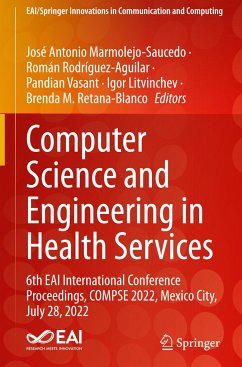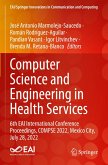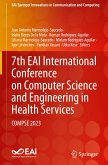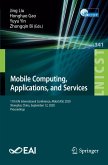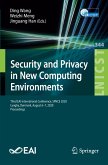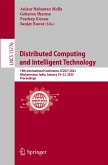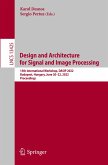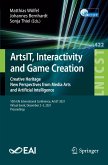Computer Science and Engineering in Health Services
6th EAI International Conference Proceedings, COMPSE 2022, Mexico City, July 28, 2022
Herausgegeben:Marmolejo-Saucedo, José Antonio; Rodríguez-Aguilar, Roman; Vasant, Pandian; Litvinchev, Igor; Retana-Blanco, Brenda M.
Computer Science and Engineering in Health Services
6th EAI International Conference Proceedings, COMPSE 2022, Mexico City, July 28, 2022
Herausgegeben:Marmolejo-Saucedo, José Antonio; Rodríguez-Aguilar, Roman; Vasant, Pandian; Litvinchev, Igor; Retana-Blanco, Brenda M.
- Gebundenes Buch
- Merkliste
- Auf die Merkliste
- Bewerten Bewerten
- Teilen
- Produkt teilen
- Produkterinnerung
- Produkterinnerung
This book constitutes the refereed post-conference proceedings of the 6th EAI International Conference Computer on Science and Engineering in Health Services (COMPSE 2022), which took place in Mexico City and online, June 28th, 2022. The papers are grouped on thematic topics: application of tools delivered by the COVID-19 pandemic; health services; computer and data science; and industry 4.0 in logistics and supply chain. The content is relevant to researchers, academics, students and professionals.
Andere Kunden interessierten sich auch für
![Computer Science and Engineering in Health Services Computer Science and Engineering in Health Services]() Computer Science and Engineering in Health Services171,99 €
Computer Science and Engineering in Health Services171,99 €![7th EAI International Conference on Computer Science and Engineering in Health Services 7th EAI International Conference on Computer Science and Engineering in Health Services]() 7th EAI International Conference on Computer Science and Engineering in Health Services164,99 €
7th EAI International Conference on Computer Science and Engineering in Health Services164,99 €![Mobile Computing, Applications, and Services Mobile Computing, Applications, and Services]() Mobile Computing, Applications, and Services38,99 €
Mobile Computing, Applications, and Services38,99 €![Security and Privacy in New Computing Environments Security and Privacy in New Computing Environments]() Security and Privacy in New Computing Environments38,99 €
Security and Privacy in New Computing Environments38,99 €![Distributed Computing and Intelligent Technology Distributed Computing and Intelligent Technology]() Distributed Computing and Intelligent Technology56,99 €
Distributed Computing and Intelligent Technology56,99 €![Design and Architecture for Signal and Image Processing Design and Architecture for Signal and Image Processing]() Design and Architecture for Signal and Image Processing45,99 €
Design and Architecture for Signal and Image Processing45,99 €![ArtsIT, Interactivity and Game Creation ArtsIT, Interactivity and Game Creation]() ArtsIT, Interactivity and Game Creation75,99 €
ArtsIT, Interactivity and Game Creation75,99 €-
-
-
This book constitutes the refereed post-conference proceedings of the 6th EAI International Conference Computer on Science and Engineering in Health Services (COMPSE 2022), which took place in Mexico City and online, June 28th, 2022. The papers are grouped on thematic topics: application of tools delivered by the COVID-19 pandemic; health services; computer and data science; and industry 4.0 in logistics and supply chain. The content is relevant to researchers, academics, students and professionals.
Produktdetails
- Produktdetails
- EAI/Springer Innovations in Communication and Computing
- Verlag: Springer / Springer International Publishing / Springer, Berlin
- Artikelnr. des Verlages: 978-3-031-34749-8
- 2024
- Seitenzahl: 304
- Erscheinungstermin: 24. September 2023
- Englisch
- Abmessung: 241mm x 160mm x 22mm
- Gewicht: 623g
- ISBN-13: 9783031347498
- ISBN-10: 3031347498
- Artikelnr.: 67880380
- Herstellerkennzeichnung Die Herstellerinformationen sind derzeit nicht verfügbar.
- EAI/Springer Innovations in Communication and Computing
- Verlag: Springer / Springer International Publishing / Springer, Berlin
- Artikelnr. des Verlages: 978-3-031-34749-8
- 2024
- Seitenzahl: 304
- Erscheinungstermin: 24. September 2023
- Englisch
- Abmessung: 241mm x 160mm x 22mm
- Gewicht: 623g
- ISBN-13: 9783031347498
- ISBN-10: 3031347498
- Artikelnr.: 67880380
- Herstellerkennzeichnung Die Herstellerinformationen sind derzeit nicht verfügbar.
Jose Antonio Marmolejo-Saucedo is a professor at National Autonomous University of Mexico, Mexico. His research is on operations research, large-scale optimization techniques, computational techniques and analytical methods for planning, operations, and control of electric energy and logistic systems. He is particularly interested in topics related to artificial intelligence, digital twins, the Internet of things and Industry 4.0. Currently, Prof. Marmolejo, together with his graduate students, leads the laboratory for the development of digital twins in companies and businesses. He received his Ph. D in Operations Research (Hons) at the National Autonomous University of Mexico. At present, he has the first-highest country-wide distinction granted by the Mexican National System of Research Scientists for scienti¿c merit (SNI Fellow, Level 3). He is a member of the Network for Decision Support and Intelligent Optimization of Complex and Large-Scale Systems and Mexican Society for Operations Research. He has co-authored research articles in science citation index journals, conference proceedings, presentations, books, and book chapters. Roman Rodriguez-Aguilar is a professor in the Faculty of Economic and Business Sciences of the "Universidad Panamericana" in Mexico. His research is on large-scale mathematical optimization, evolutionary computation, statistical learning, computational intelligence, health economics, energy economics, mathematical finance, competition, and market regulation. He received his Ph.D. at the School of Economics at the National Polytechnic Institute, Mexico. He also has a master's degree in Engineering from the School of Engineering at the National University of Mexico (UNAM), a master's degree in Administration and Public Policy from the School of Government and Public Policy at Monterrey Institute of Technology and Higher Education, a postgraduate in Applied Statistics at the Research Institute in Applied Mathematics and Systems of the UNAM and his degree in Economics at the UNAM. Before joining Panamericana University, he worked as a specialist in economics, statistics, simulation, finance, and optimization, occupying different management positions in various public and private entities such as the Ministry of Energy, Ministry of Finance, and Ministry of Health. He has co-authored many research articles in science citation index journals, conference proceedings, presentations, and book chapters. Professor Rodríguez has supervised many MSc. and Ph.D. Students. He is a member of the National System of Researchers Level II of CONACYT in Mexico. Dr. Pandian Vasant is a senior lecturer at Universiti Teknologi Petronas, Malaysia and an Editor-in-Chief of International Journal of Energy Optimization and Engineering (IJEOE). He holds Ph.D. in Computational Intelligence (UNEM, Costa Rica), M.Sc. (University Malaysia Sabah, Malaysia, Engineering Mathematics) and B.Sc. (Hons, Second Class Upper) in Mathematics (University of Malaya, Malaysia). His research interests include Soft Computing, Hybrid Optimization, Innovative Computing and Applications. He has co-authored research articles in journals, conference proceedings, presentation, special issues guest editor, book chapters (248 publications indexed in Web of Science) and General Chair of EAI International Conference on Computer Science and Engineering in Penang, Malaysia (2016) and Bangkok, Thailand (2018). In the year 2009 and 2015, Dr. Pandian Vasant was awarded top reviewer and outstanding reviewer for the journal Applied Soft Computing (Elsevier). He has 27 years of working experiences at the universities. Currently he is an Editor-in-Chief of International Journal of Energy Optimization and Engineering, and Member of AMS (USA), NAVY Research Group (TUO, Czech Republic) and MERLIN Research Group (TDTU, Vietnam). Igor Litvinchev received his M.Sc. degree in Applied Mathematics from Moscow Institute of Physics and Technology (Fizteh), Russia; Ph.D. in Systems Theory and Operations Research and Dr. Sci. (Habilitation) in Systems Modeling and Optimization from Computing Center, Russian Academy of Sciences, Moscow. He is currently a Professor at Nuevo Leon State University (UANL), Mexico. His research is focused on large-scale systems modeling, optimization, and control with applications to interdisciplinary research. Professor Litvinchev is an author of 4 books and an editor of 8 more books published by Kluwer, Springer, and Elsevier. He published more than 90 research papers in leading international journals and served in Program and Organizing Committees for more than 50 international conferences. His research was supported by more than 30 grants from NATO Scienti¿c Affairs Division and European Community; ISF (USA) and RFBR (Russia); CNPq and FAPESP (Brasil); BRFBR (Belarus); CONACYT, PROMEP and PAICYT (Mexico). Professor Litvinchev is a member of the Russian Academy of Natural Sciences and Mexican Academy of Sciences. He is a co-founder of Mexican Society of Operations Research and Mexican Logistics and Supply Chain Association. Brenda Retana-Blanco studied a MSc in International Business at The Dublin Institute of Technology in Dublin, Irlanda, diploma in business at Macquarie University, Sydney Australia and a BS in Industrial Engineering at Anahuac University Mexico. She is committed, proactive, process-oriented and focused on execution. Brenda is particularly interested in developing academic projects, financial and insurance sector with the ability to relate and work in multicultural teams in Mexico and overseas. She is currently head of Industrial Engineering Department at Universidad Anahuac Mexico. It leads the national and international accreditations of the program. It is also responsible for updating the curriculum of the career, strengthening the knowledge lines of Operations Research, Data Mining, Manufacturingand Quality.
Chapter 1. Introduction.- Chapter 2. Computer and Data Science.- Chapter 3. Artificial Intelligence tools and applications.- Chapter 4. Machine learning for optimization.- Chapter 5. Intelligent Systems.- Chapter 6. Cyber-physical systems.- Chapter 7. Internet of medical things.- Chapter 8. Blockchain technology in healthcare.- Chapter 9. Robotics in the healthcare industry.- Chapter 10. Mixed realities.- Chapter 11. Optimization, simulation and predictive analytics in healthcare.- Chapter 12. Health care systems optimization.- Chapter 13. Health care delivery, measurement, and modeling.- Chapter 14. Health information systems.- Chapter 15. Environmental health.- Chapter 16. Economic analysis of health systems.- Chapter 17. Conclusion.
Chapter 1. Introduction.- Chapter 2. Computer and Data Science.- Chapter 3. Artificial Intelligence tools and applications.- Chapter 4. Machine learning for optimization.- Chapter 5. Intelligent Systems.- Chapter 6. Cyber-physical systems.- Chapter 7. Internet of medical things.- Chapter 8. Blockchain technology in healthcare.- Chapter 9. Robotics in the healthcare industry.- Chapter 10. Mixed realities.- Chapter 11. Optimization, simulation and predictive analytics in healthcare.- Chapter 12. Health care systems optimization.- Chapter 13. Health care delivery, measurement, and modeling.- Chapter 14. Health information systems.- Chapter 15. Environmental health.- Chapter 16. Economic analysis of health systems.- Chapter 17. Conclusion.

